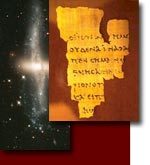| Site Map | Contacts | Links | Newsletter | |
Genesis 1:2
Was Blowing Upon the Surface of the Waters
Hebrew Text
mymh ynp-lu tpjrm - was blowing upon the surface of the watersHebrew participle tpjrm, indicates continuous action. The root word pjr occurs only two other times in the OT (Deut. 32:11, and Jer. 23:9).
Deuteronomy 32:11 says, "like an eagle that stirs up its nest and hovers (pjr) over its young, that spreads its wings to catch them and carries them on its pinions" (NIV). There is some debate whether pjr means brooding, hovering, soaring, or violent flapping in this verse. This is the same verb form as in Genesis 1:2, and both are describing the creative activity of the spirit. Some have suggested that the spirit is like a bird brooding over the world egg from which the earth hatched. Gaster sees here the ancient idea of the wind-bird where the wind is described as a bird-god (1969, 5). The wind in the OT is sometimes described as having wings (2 Sam. 22:11; Psa. 18:11, 104:3; Hos. 4:19).
Jeremiah 23:9 says, "My heart is broken within me; all my bones tremble. I am like a drunken man, like a man overcome by wine" (NIV). Here pjr clearly means shake or tremble.
Stadelmann concludes, "The meaning of the verb rhp is the same in three places in which it occurs, and it indicates in all cases violent, not gentle motion" (1970, 15).
Ugaritic Literature
The cognate word for pjr in Ugaritic is rhp. It occurs in Aqhat which says, "above him eagles hovered, a flock of hawks looked down, [Among] the eagles Anat hovered" (KTU 1.18 IV.31-2; Gibson, 113; COS, 350).
In the Baal-Yam Cycle it seems that Baal uses the winds to defeat the sea. It says, "You’ll whirl in Ba’lu hand, like a hawk in his fingers. Scatter (him) O Mighty [BA’lu]" (COs, 249, KTU 1.2).
Akkadian Literature
In the Disputation Between Bird and Fish it says:
Then came Bird, lion-faced, and with an eagle’s talons,
Winging towards its nest. It stops in mid-flight;
Like a hurricane whirling in the midst of heaven, it circles in the sky;
Bird, looking about for its nest spreads open wings and legs. (COs 1997, 583).
Here the bird soaring around is described as "a hurricane whirling." It is not a gentle breeze.
In the Legend of Adapa, Adapa was mad at the South wind for capsizing his boat and said, "I will break thy wi[ng]! Just as he had said (this) with his mouth, The wing of the sou[th Wi]nd was broken. For seven days The [south win]d blew not upon the land" (ANET, 101).
In Enuma Elish Marduk uses the winds to help him defeat the monster Tiamat. It says, "He brought forth Imhullu the Evil Wind, the Whirlwind, the Hurricane, The Fourfold Wind, the Sevenfold Wind, the Cyclone, the Matchless Wind; Then he sent forth the winds he had brought forth, the seven of them" (ANET, 66).
Jewish Literature
Genesis Rabbah says, "The spirit of God blew is not what is written, but rather, The spirit of God hovered like a bird which is flying about and flapping its wings, and the wings barely touch [the nest]" (II.IV.4.E; Neusner, 35).
Tertullian lived from 145 to 220 AD. Later in life he became a Montanist. His writing Against Hermogenes is written against the view that matter is eternal. God did not use pre-existent matter to create the world (Roberts and Donaldson 1981, Vol.3, 477-502). He also says that the word "earth" does not mean "matter" (Ibid., 490-1).
Basil follows the LXX saying the earth was invisible for which he gives two reasons. First, the earth was submerged under water and therefore could not be seen. Second, light had not been created so the earth lying in darkness could not be seen. Darkness was unlighted air (1963, 22). He views a literal earth that was created but submerged contrary to Ambrose.
Basil sees the Holy Spirit of God stirring above the waters with warm and fostering care like a bird brooding over its eggs (Ibid., 31).
Ambrose uses the theory of atoms to explain the matter called "earth" in Genesis 1:1-2. Greek philosophy used similar terms to "invisible" and "unformed" to describe matter (aneideos, amorfos, apoios; Van Winden, 208).
Augustine concludes, "Hence, all these expressions, whether heaven and earth, or the earth invisible and without order, and the abyss with darkness, or the water over which was borne the Spirit of God, are names for unformed matter" (Against the Manichees, Book 1:12; 1991, 60).
Jerome in Hebrew Questions on Genesis states, "In place of what is written in our codices as moved, the Hebrew has merefeth, which we can render as was brooding over or was keeping warm, in the likeness of a bird giving life to its eggs with warmth" (Hayward, 1995, 30).
Next - Genesis 1:3-5 - Let There
Be Daylight
Bibliography
